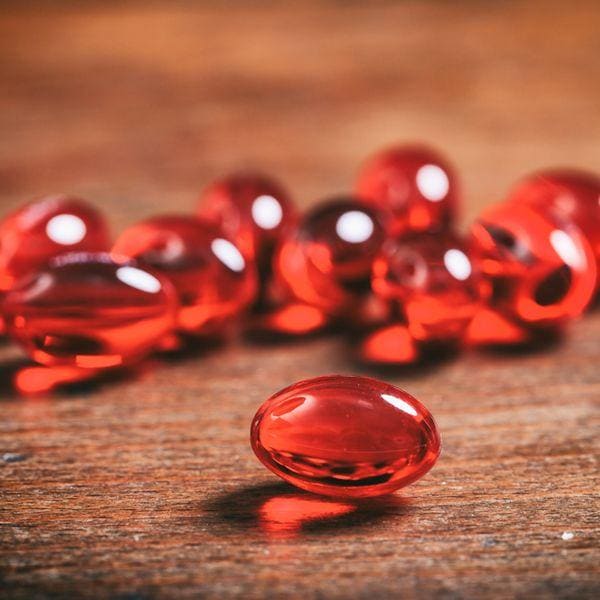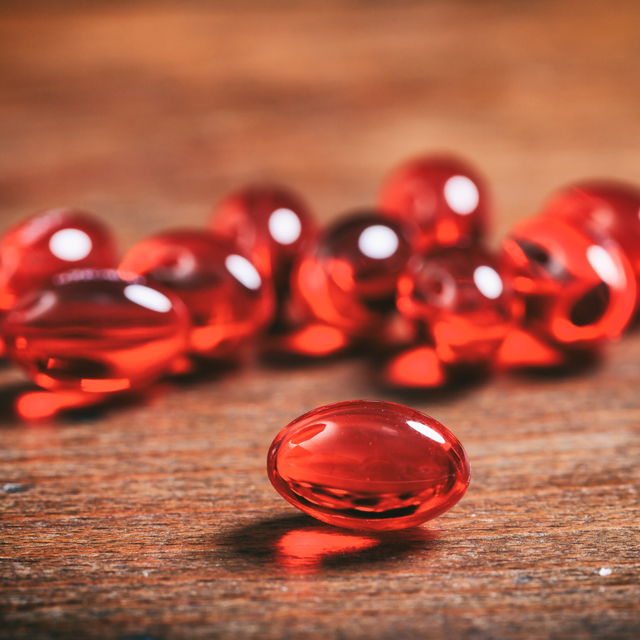Krill Oil Dosage
Thinking about trying krill oil but not sure where to start? The omega-3 fatty acids in krill oil are good for your body in so many ways. In fact, krill oil may be one of the best ways to supplement your daily omega-3 intake because researchers believe the essential fatty acids in krill oil may be absorbed by your body much more easily than the omega-3 fatty acids from fish oil.1 Plus, with krill oil, you get the added benefits of astaxanthin.
When considering how much krill oil to take, it’s important to understand the nutrients within krill oil supplements that provide most of the benefits, because it’s the amounts of these nutrients in your supplements that you’ll want to monitor. The benefits of krill oil come from a few primary nutrients - the omega-3 fatty acids Eicosapentaenoic Acid (EPA) and Docosahexaenoic Acid (DHA), the carotenoid astaxanthin, and phospholipids.
Eicosapentaenoic Acid (EPA)
The essential fatty acid EPA may help support the health of your brain, heart, mood and vision.2
Docosahexaenoic Acid (DHA)
DHA is essential for the healthy development and function of the brain and is reported to have similar benefits related to heart health, mood and behavioral support as EPA.3
Astaxanthin
Astaxanthin may provide antioxidant support for the eyes,4 skin5 and liver6 helping to protect against free radical damage and UVA exposure.5 It also may help support healthy joints7 and healthy blood lipid levels.8
Phospholipids
Krill oil also contains naturally-occurring phospholipids, including phosphatidylcholine, which may support brain health and may help the body absorb the EPA and DHA in krill oil more efficiently.9
How Much Krill Oil Should I Take?
Deciding how much krill oil to take can seem a little less clear than with some other nutrients. There are no minimum intake guidelines available from the Department of Agriculture (USDA), the Food and Drug Administration (FDA), or the National Institutes of Health (NIH) specifically for krill oil. The NIH does indicate that “consuming EPA and DHA directly from foods and dietary supplements is the only practical way to increase levels of these fatty acids in the body.” 10
The FDA recommends keeping your total combined daily intake of EPA and DHA below 3 g day, with no more than 2 g per day of that coming from dietary supplements.10 However, some clinical trials have exceeded those levels.10
How Much Krill Oil Should You Take Per Day?
The potential health benefits of omega-3 fatty acids, and more specifically EPA and DHA, have been the focus of decades of scientific research on both food and supplemental sources.10 Dietary supplements used in the studies have varied between krill oil, fish oil, and nonspecific supplements containing EPA and DHA.
We have listed some details of studies and clinical trials below using EPA and DHA that do not exceed the FDA’s recommended maximum intakes, along with the daily amounts used in those studies.
How Much Omega-3 Per Day & Omega-3 Benefits
- Heart Health
Supplementation with 1 g per day of omega-3 fatty acids containing 850-882 mg of EPA and DHA for 3.5 years supported healthy blood lipid levels.10 Also, early research on astaxanthin (an antioxidant carotenoid found in krill oil) suggests it may help support healthy blood lipids as well.9 - Cognitive Health
Some studies associate diets high in omega-3s with cognitive health. A 2016 study linked an incremental increase of DHA by 100 mg per day with a 14 - 37% decreased risk of some cognitive concerns.10 And a small trial involving supplements containing 1,290 mg DHA and 450 mg EPA daily for 12 months suggested it may offer some memory support.10 - Vision Support
Observational studies involving people who consume high amounts of fatty fish (which is rich in omega-3 fatty acids) or take omega-3 supplements suggest that omega-3s may support healthy vision. One study involving 2,275 people 65 years and older who ate fatty fish at least once per week had a 53% lower occurrence of vision health concerns.10 For reference, farmed and wild caught salmon, one of the richest food sources of omega-3 fatty acids, contains between 1.22 - 1.24 g of DHA and 0.35-0.59 g of EPA per 3 oz. serving.10 - Joint Health
Studies suggest omega-3 fatty acids may help protect joints.10 But some studies involving joint health have focused on higher amounts of EPA and DHA than the FDA’s recommended maximum.10 If you take krill oil for joint health, make sure you stay under 2 g of combined EPA and DHA per day unless your doctor recommends otherwise. - Mood Support
Researchers have not published conclusive evidence of omega-3 fatty acids and mood support but several studies have linked mood concerns with low levels of omega-3 fatty acids.11 So it may be a good idea for people with mood concerns to make sure they are getting enough omega-3 fatty acids.
Should You Take Krill Oil in the Morning or at Night?
There are no official studies that specify the best time to take krill oil supplements each day. Some people claim that taking your krill oil in the morning may give you an opportunity to gain the advantages of healthy omega-3 fatty acids all day long, but since essential fatty acids build up in your system over time, what time you take it isn’t as important as just remembering to take it each day. If taking krill oil in the morning makes it easier for you to remember to take it, that’s great! Some supplements may upset an empty stomach however, so be sure to eat a healthy meal before taking supplements.
The Best Krill Oil Dosage for You
Everyone is unique, and the best intake of krill oil for you will depend on several factors, including your age, health and any prescription or over the counter medicines you take.12 If you take any medications that affect your blood platelets or clotting, talk to your doctor before taking krill oil supplements. Also, you should not take krill oil within two hours of taking weight loss medicines that affect how your body absorbs fat.12
Most krill oil supplements are available in doses between 500 mg - 1 g per capsule. Here are a few of our most popular krill oil supplements:
Swanson 100% Pure Krill Oil - Each 500-mg capsule contains 60 mg of EPA and 27.5 mg of DHA, plus 40 mcg of astaxanthin from Superba2™ krill oil, which offers high-quality bioavailability and is produced with a patented technology that reduces impurities for an odor-free krill oil of exceptional quality.
Maximum Strength Krill Oil - Superba2™ krill oil is also the key ingredient in our maximum strength krill oil formula, which boasts 120 mg of EPA and 55 mg of DHA, along with 80 mcg of astaxanthin in each 1 g softgel.
Krill Oil & Astaxanthin - This supplement provides 60 mg of EPA and 27.5 mg of DHA from Superba2™ krill oil in each softgel, as well as an extra helping of astaxanthin. It contains 4 mg of astaxanthin, which is 50 times more astaxanthin than our maximum strength krill oil supplement provides.
Krill Oil & Curcumin - Delivers 60 mg of EPA, 27.5 mg of DHA, 40 mcg of astaxanthin from Superba2™ krill oil, plus 300 mg of curcumin for added heart and joint support.
RIMFROST Krill Oil with Pure Coconut Oil - This stomach-friendly formulation of krill oil offers a boost of pure coconut oil. It contains 500 mg of krill oil and 75 mcg of astaxanthin from krill, along with 50 IU of vitamin A and 400 mcg of coconut oil.
If you enjoyed this post, you may like reading Krill Oil vs Fish Oil: Which Has More Benefits?
For more on supplements for total-body health, see Game-Changer Nutrition and Supplements for Optimal Health.

About Amy Sunderman, MS, RD
Amy is a registered dietitian, nutritionist and author with more than 20 years of experience in the supplement industry. Amy is passionate about dietary supplements and the health benefits they offer. She enjoys working to find novel nutritional ingredients with strong clinical research behind them to drive innovation and provide health-promoting products to consumers.
*These statements have not been evaluated by the Food and Drug Administration. These products are not intended to diagnose, treat, cure, or prevent any disease.
Sources
1. The Health Benefits of Krill Oil vs. Fish Oil. University of Washington. Read source
2. The Importance of Marine Omega-3s. Nutrients. Read source
3. Health Benefits of Docosahexaenoic Acid (DHA). National Library of Medicine. Read source
4. Astaxanthin. Examine. Read source
5. Cosmetic Benefits of Astaxanthin on Human Subjects. National Library of Medicine. Read source7
6. Astaxanthin as a Potential Protector of Liver Function. Journal of Clinical Medicine Research. Read source
7. FlexPro MD: a Mixture of Krill Oil, Astaxanthin, and Hyaluronic Acid. Journal of Medicinal Food. Read source
8. Positive Effects of Astaxanthin. Springer Link. Read source
9. Incorporation of EPA and DHA into Plasma. National Library of Medicine. Read source
10. Omega-3 Fatty Acids. National Institutes of Health. Read source
11. Omega-3 Fatty Acids and Mood Disorders. The American Journal of Psychiatry. Read source
12. Krill Oil Overview, Uses, Side Effects. WebMD. Read source




